Ahhh! Enough with the same old boring posts about engagement rings!
Yes, we know the diamond industry wants us to spend more. Yes, De Beers is evil, and yes, synthetic diamonds are flooding the market, and yes, I saw “Blood Diamond” with Leonardo DiCaprio. And yes, we know about your aunt’s cousin’s brother who got a ring for $2.59 and they’ve been happily married for 80 years.
That’s great.
But when I decided to propose to my girlfriend, I started doing research — and I found myself getting increasingly frustrated. I had real questions.
What type of ring should I get? Do the “4 Cs” really matter? Is this jeweler going to rip me off? Do I really need to save two months’ salary?
I did a quick Google search and I felt myself getting even more frustrated. The advice on other sites told me to “do my research,” “find out her ring size,” and “pick my budget.”
Uh … I ALREADY KNOW THAT! No one addressed the real questions I had.
So, I did my own research and now I’m going to show you exactly what I ended up doing, including:
- The exact word-for-word conversations I had to get on the same page with my girlfriend about the kind of ring she wanted
- How I navigated the “cost” issue — including what I discovered about what really matters when buying a ring
- What I learned from an NYC Diamond District jeweler who broke the diamond industry down for me
This is the stuff you won’t find in other engagement ring posts.
Hi, my name is Ramit Sethi. I’m the author of a New York Times best-selling book on personal finance. Don’t worry, I’m not going to make you feel bad about wanting to buy an engagement ring (or even spending a lot on it). I don’t have any secret backroom deals with diamond dealers. I just want to show you what nobody else is talking about when it comes to buying an engagement ring.
I spent a huge amount of time learning about the diamond industry and ended up buying a ring that my girlfriend Cass — now fiancée — loved.
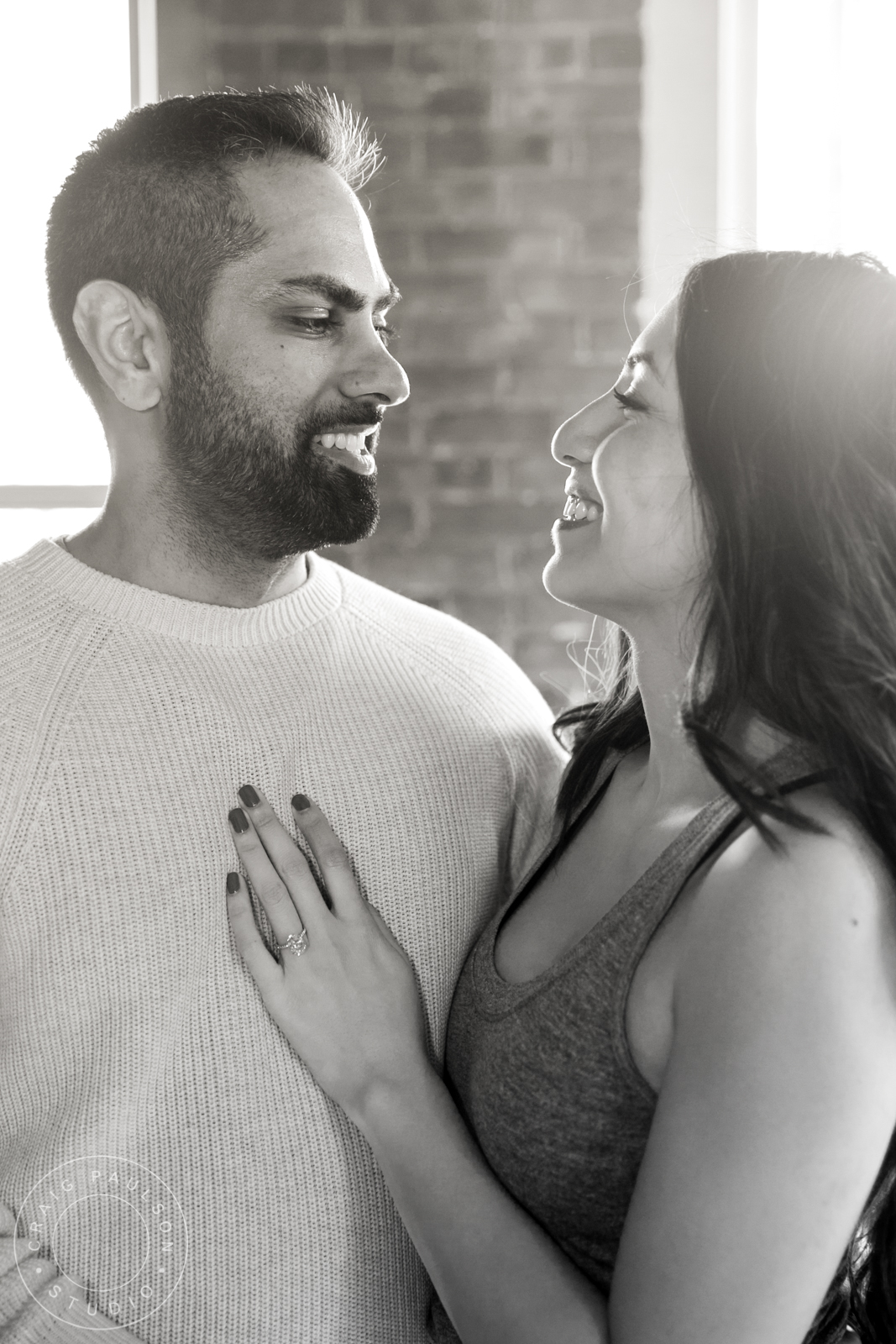
Here’s what I knew going into the process: I’d met a woman I loved and I knew that an engagement ring was important to her. She never mentioned size or cost, but I knew she wanted a nice ring that was ethically sourced.
This is my personal experience finding the perfect ring for her with some additional insights from you guys, my readers.
So here we go…
The 1 thing that matters above all else
In my life, I have discovered one solitary truth:
Every single comment about engagement rings focuses on saving money. Always.
In ANY article about engagement — no matter which site, which author, which date — 99.99% of comments will say, “LOL! Buying an engagement ring? I spent $0.32 and we’ve been married for 43 years!”

Guys, there are plenty of ways to save money on a ring. You can find them on 50 million other articles where people race to the bottom of how little they spent, then brag about it.
But I have another view:
Your engagement ring is a unique gift, which you — in consultation with your partner — decide on.
If you want to spend $100 on a ring, great! If you want to spend $50,000 on a ring, and you can afford it, also great. Some people prefer a ring that was passed down from their mother. Others prefer an ultra-modern ring, or a heritage design, or an oval shape. I know a guy who spent $300 and I know a guy who spent $100,000 on his engagement ring. Both have great marriages.
In other words, I don’t believe in focusing solely on the price — I want to focus on the value of your gift, which ultimately only you decide. You should consider what your partner wants, but ultimately you decide. Not your friends, not society, not De Beers, and certainly not some random frugalista commenter on the internet.
So I knew I wasn’t going to focus on finding the cheapest ring. I was going to find the ring that was perfect for my fiancée. Here’s how I did it.
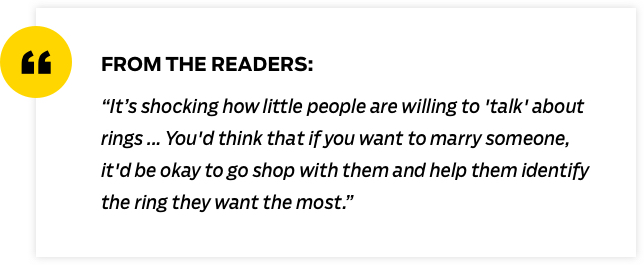
What to do before you buy
Until I got deep in the process, I didn’t truly understand the sales mechanisms that the industry has created to encourage you to spend more. These include creating their own rating system (the 4 Cs: cut, color, clarity, and carat), creating their own governing body (GIA), and even their own set of rituals and phrases (“A diamond is forever”).
Wait a sec. Is this a religion? Or buying a commodity?
As one friend told me, “I didn’t know what I was doing, but I knew I was doing it wrong.”
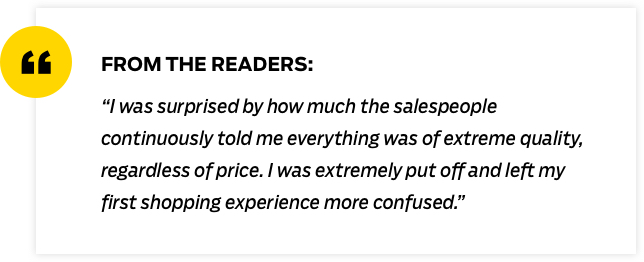
I realized that 80% of the work is done before you set foot in a jewelry shop. If you just walk in and say, “Uhh, I’m not sure … what do you recommend?” then you’re going to get taken for a ride and end up being one of those guys who gets bitter about the process. Average process, average results.
But if you arm yourself with information, this can actually be fun.
I went a little crazy and mapped out the entire process. Hey, what can I say? I love systems.
The map looked like this:
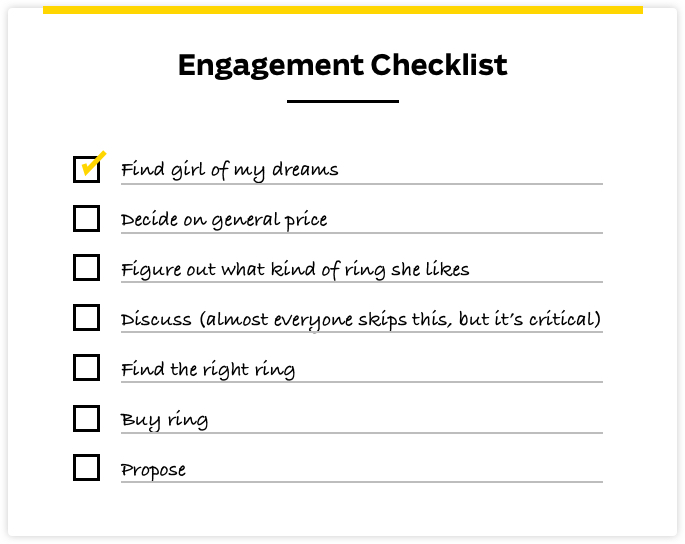
There are lots of sub-steps beneath each step. But remember the big insight that “80% of the work is done before you ever set foot in the room”? You can see it in the outline: Most of the work — 80% — is done before you ever get to the “Buy ring” step. Get these early steps right, and the rest is just details.
Start from zero
First of all, forget all the bullshit about two months of salary. That is pure marketing nonsense. Look at your own financial situation to decide what you can comfortably afford. I asked more than 1,500 of my readers, and depending on income, people typically spent between 4% and 8% of their yearly income.
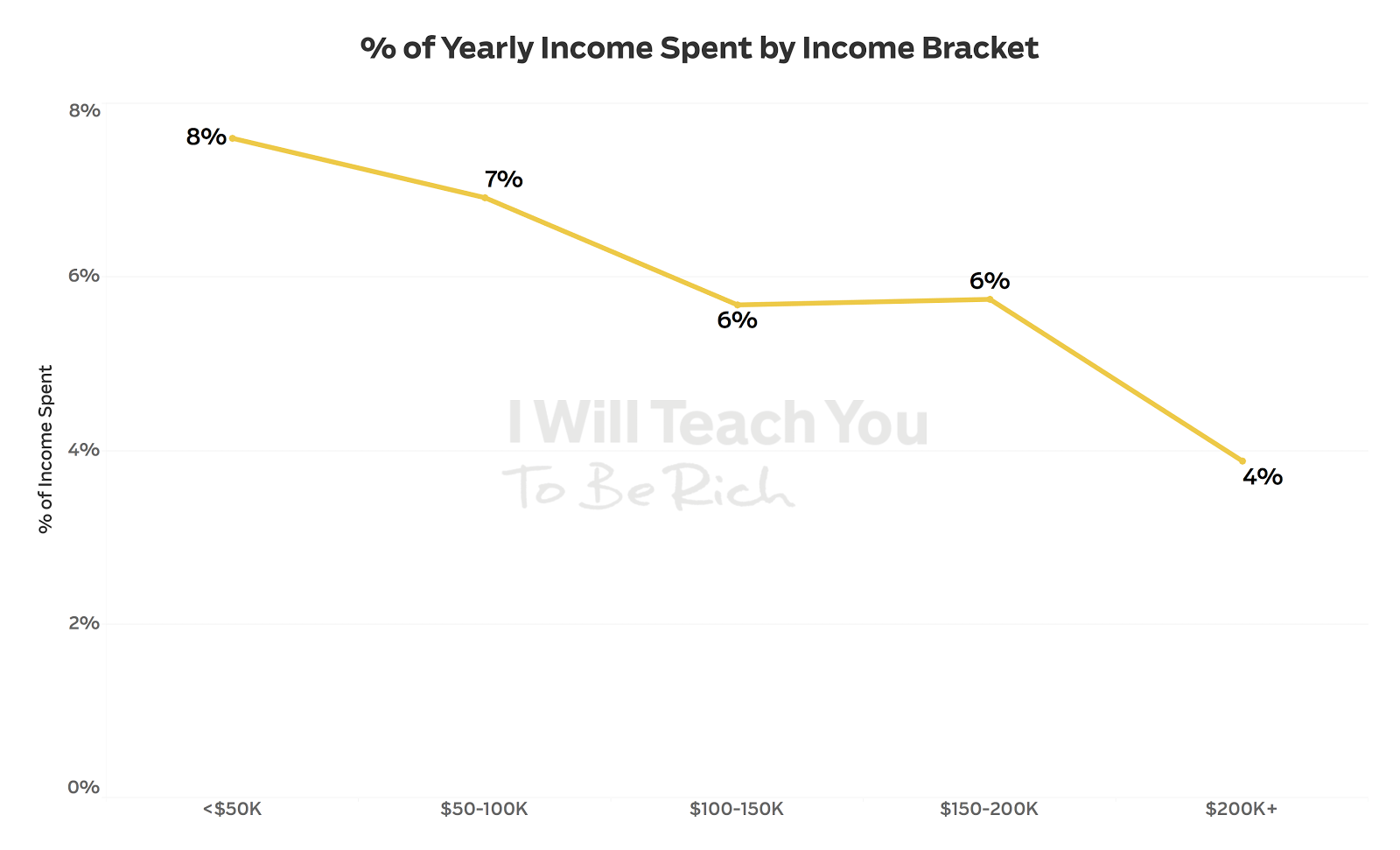
Two months’ salary is 16%, by the way. Click to enlarge.
So I started with getting a general price down. It could be “$1,000 to $3,000” (with room to stretch to $3,500), or it could be “around $10,000” or even “$40,000 to $60,000.” Whatever it is, know it and remember it.
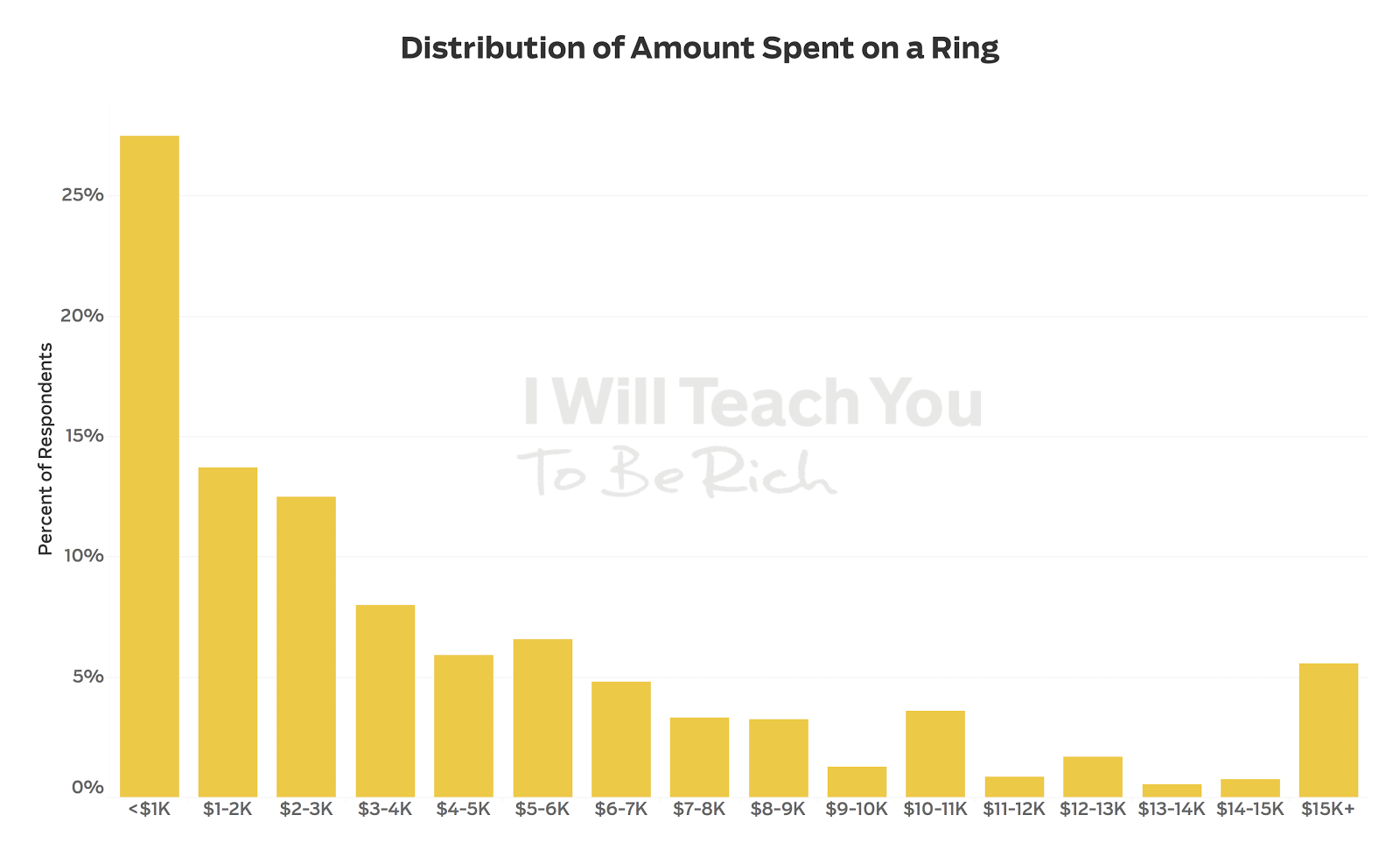
This data isn’t scientific. But with over 1,500 results, it gives you a general sense of how much people spend. Personally, these numbers seem low for what I know my friends in NYC spent. But this is the full dataset without regard for geography. Click to enlarge.
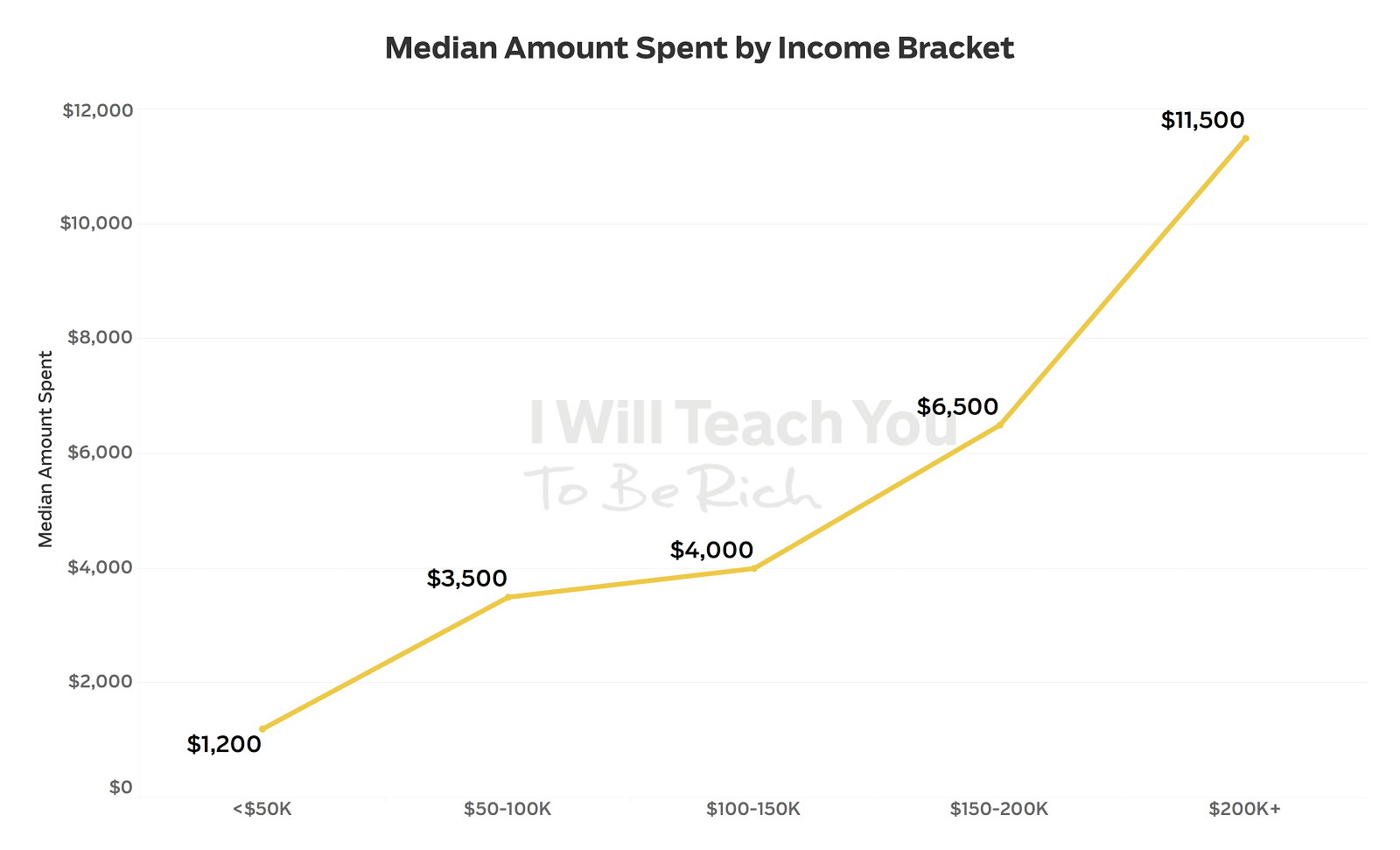
If you’re having trouble settling on a budget, find your income bracket here for a general benchmark. Click to enlarge.
A general number helps because when you walk into a store, you’re not a mark — you’re in control. You wouldn’t ask a car salesman what kind of car you should buy. You’d do your homework first! Do the same thing for your engagement ring.
Talk to your partner. THIS IS IMPORTANT
Then have the conversation with your partner. (Note: I’m using “her” and “girlfriend” because my fiancée is a woman and I’m a man, but you can apply these same lessons to any relationship.)
Feel free to use this word-for-word script to get on the same page about your engagement ring:
“I really love you and I’m excited to spend the rest of our lives together. I know we’ve talked about marriage already, but there’s actually something I want to bring up that I want to be open with you about: I’d love to talk about the ring. It’s something I’ve been thinking about, and I’m guessing you’ve been thinking about it too.
What kind of ring do you have in mind? Have you thought about the band? I’d love to hear what you think.”
Things I did in the conversation:
- I made sure to contextualize the ring as something we were doing together
- I also made sure to be friendly and open
- I didn’t bring any chips on my shoulder (e.g., anxiety about budget concerns) into the discussion
The big insight here is to actually ASK THE RIGHT QUESTIONS about the ring. Or, frankly, any questions at all! It’s amazing how many guys go into the ring-shopping process without knowing anything about what their partner wants. You knuckleheads create your own stress and anxiety — all because you’re not willing to open up the conversation and ask.
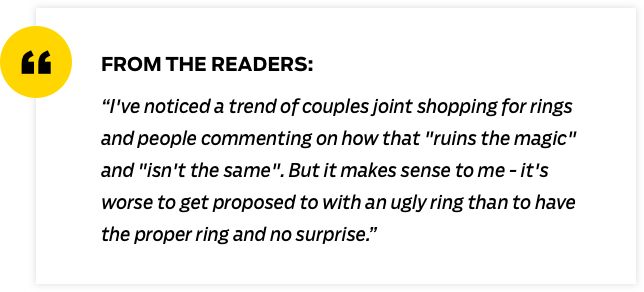
Over time, I came to believe part of the reason we’re afraid to talk it out is that many of us — men and women — absorb this Disney-esque invisible script that everything around the proposal should be a surprise.
Feel free to keep the date of your proposal a surprise, how you’re going to propose, even the ring itself — but the fact that you’re going to propose and the type of ring should not be a surprise. Stop being morons and trying to randomly decide on some of the biggest decisions of your lives together! Here are a few important things to talk about: “Do you want a public or private proposal? What color band? What shape? Let’s get on the same page about finances, because that will affect both of us as we build a life together.”
So, have the conversation. The script above shows the importance of your partner’s feelings to you. You’re asking her what kind of ring she envisions — is it oval? Round? Something passed down from your mom? (During the conversation, it’d be a great idea to ask her what her ring size is as well. Just a simple, “By the way, what is your ring size just so I know it?”) By asking your partner questions, you allow them to lead the conversation and create a really positive experience.
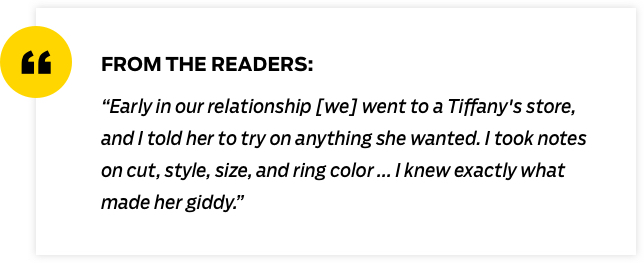
Wrapping up the conversation
“I really appreciate that we can be open about this. I’m going to think about it, but I just wanted to say thanks. It’s great to talk about this and I’m excited for this next step.”
OK, the conversation went well, but I’d also planned just in case it hadn’t gone well. What if she’d told me she wanted some ring that was totally out of my budget? Fortunately, I didn’t have to have this conversation — but I was ready just in case:
The backup plan: “What if she wants a ring that I can’t afford?”
“I want to talk to you about something that makes me a little uncomfortable but want to be honest about: From the last time we talked, it seemed like the ring you wanted was XYZ. Am I reading that right?” (Clarifies any misunderstandings you might have)
“I would love to get you the ring of your dreams … but I also want to be thoughtful about our finances as we build our lives together.” (Reiterates how you’re keeping the relationship in mind)
“Based on our budget, I can’t do the one you want right now. But I heard what you’re looking for and I’m going to do my best to find the most perfect ring to signify our relationship.” (Shows that you’re honest about the situation but also considerate of what she wants. Now begin wrapping up)
“Thanks, this was really great. I’m going to think about a few things. I really appreciate having this discussion. It feels really good to know we can have an honest discussion together.”
Ask your fiancée to send you what they like
After my fiancée and I talked, she proactively sent me an email with examples of rings she liked, rings she didn’t, band preference — everything.
I don’t think that’s weird, I think it’s awesome.
This is a gift she’s going to wear for the rest of her life. I want to know what she wants! I want her to be thrilled with it. Be sure to nudge your fiancée to do the same before you go shopping. Below is the email my fiancée sent. I added the yellow boxes and arrows to showcase what’s happening in the email.

Notice the details: color, shape, level of details, etc. This just helped me narrow down my choices in a huge way. Get this information from your partner!!
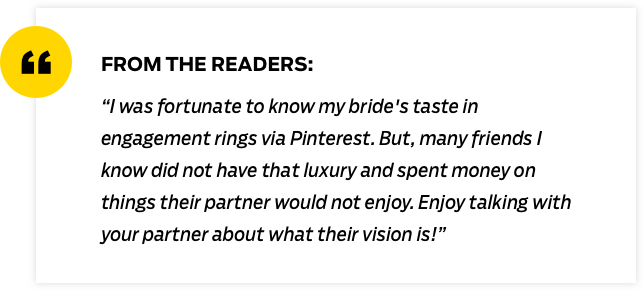
Size and bling: The only 2 things that matter
OK, now that you have a rough idea of what your partner wants and you’re ready to start looking, it’s time for some diamond-industry truths.
The diamond industry created the “4 Cs” as a way for you to “measure” the value of a diamond. This is a helpful framework to evaluate a diamond — but as soon as you learn it, you will realize how limiting it is.
Here’s what I learned from my experience: When it comes to the diamond, 2 things actually matter: size and bling (the visual appeal — think “sparkle”). In that order.
People get mad hearing this, but you should ask the experts: people who’ve bought diamonds. I remember a bunch of my guy friends at a bachelor party talking about when they bought engagement rings. “Everyone will say they care about all kinds of different parts of rings, but when it comes down to it, size and the bling are the only things that matter.”
Each married guy — guys who had actually bought diamonds for their partners — just nodded and laughed. They all knew it was true.
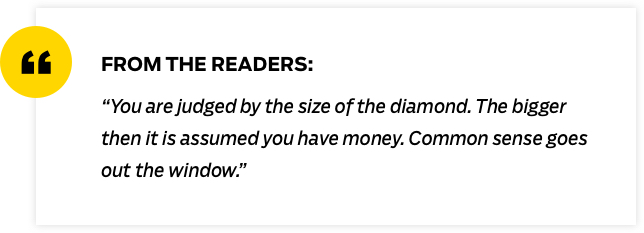
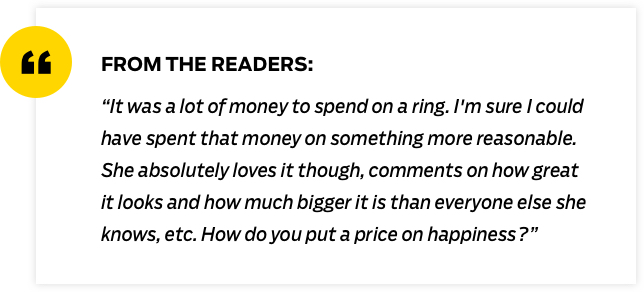
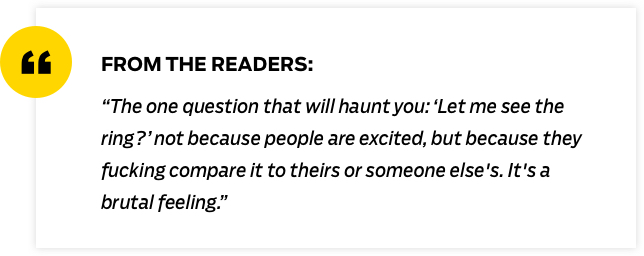
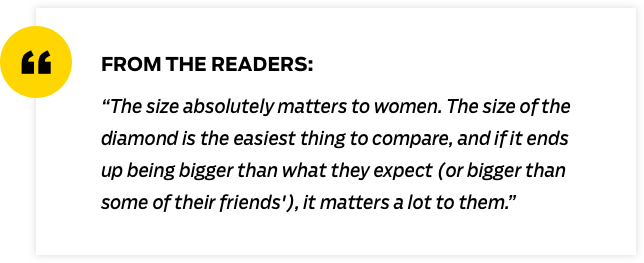
There’s a lot to unpack here, but I’m intentionally not getting into the socio-political aspects of diamonds. This post is specifically about what I learned buying a diamond.
In short: Yes, you should do your research on the 4 Cs to get a feel for the terminology that will be used by your jeweler. And yes, it’s good to compare diamonds to each other. But ultimately, size and bling (“sparkle”) are the primary things that matter.
This means that the most important aspects of the ring are purely visual. Now that you know the 4 Cs, forget about them. I’ve seen high-grade diamonds that looked duller than low-grade ones. I’ve seen two oval diamonds, both within $2,000 in price — and one looked about $20,000 more expensive.
“Clarity” is the absolute stupidest one of all. It describes tiny micro-blemishes on the diamond (this is where you use a jeweler’s loupe to inspect it). Guys, let’s get real. The naked eye can’t see these blemishes — and you will never use a loupe in real life — so it’s pointless to weigh this in your purchase.

As one jeweler told me, “You should get educated about the 4 Cs. But using cut and clarity is like buying a calculator based on its length and width.”
Call it the “Instagrammization” of diamond rings. The visual appeal matters more than anything else. If you dig deeper, there are a lot of reasons why: When your fiancée announces the engagement, there will be photos highlighting the ring. The first thing her friends will do is say, “Let me see the ring!” Whether you like it or not, the ring is a social statement. My philosophy is to acknowledge the game being played around you. You can choose whether or not to play, but know the game.
Some people find this distasteful. I found it liberating.
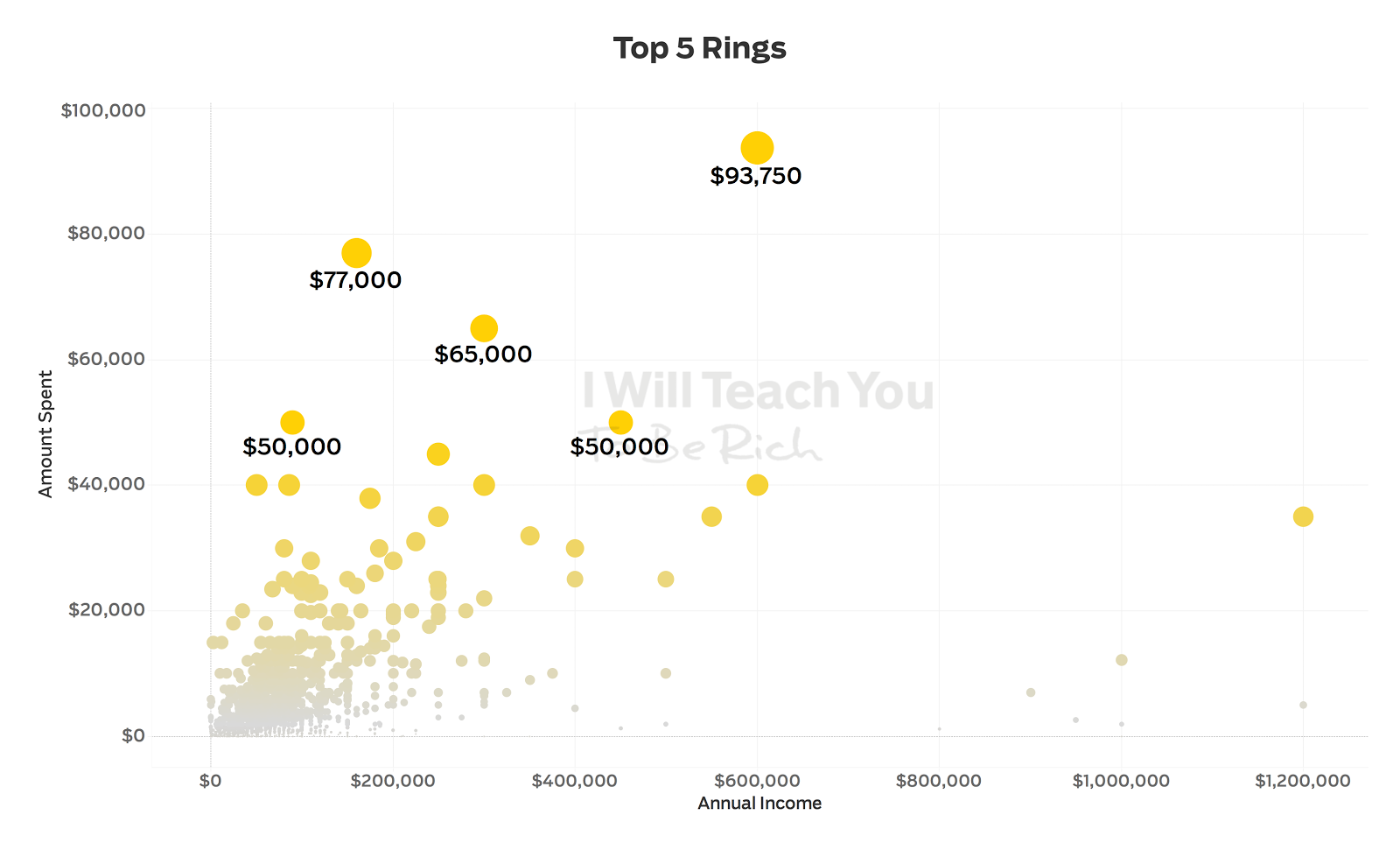
Out of 1,500+ respondents, these are the five most expensive rings. Here they are graphed according to income levels. Click to enlarge.
Think about it — now that I knew the visual appeal mattered most, I could focus my search around the look of the diamond. I could instantly discard most of the nonsense around the “perfect” diamond.
This is an area where you can “capture value,” or save money, since you don’t need to weigh it in your consideration.
So forget about micro-blemishes, the stories you hear about the diamond heritage, and resale value. This is a gift, not an investment. Focus on the two key drivers that people want — size and bling — and get the ring that you and your partner discussed.
In other words:
- Use your eyes to judge a diamond your partner will love. Don’t let the 4 Cs lead you astray
- In my experience, size and bling (“sparkle”) matter most. Be smart. Don’t buy a big diamond that has no bling. It’s important to balance the two
- Above all, be sure you know what your partner wants and loves! Don’t let your preconceived notions (or worse, society’s) guide your decision. This gift is about your partner
By now, you know your budget, the type of ring and band, and you know to focus on size and bling. Time to get the ring.
How I went shopping for the ring
I love the phrase, “Play from a position of strength.” You’re about to make a large purchase — so act like it. Make the salespeople work for you. Be crystal clear with what you want and what you expect. Of course, be polite — but remember you’re playing from a position of strength.
Hey, I know everyone thinks the proposal is all about romance, but I also love LOGISTICS. I’ll show you exactly how I did it.
By now, you’ve had a conversation with your partner about what she’s thinking about when it comes to a ring. You’ve carefully thought about what you want to do and what you can afford. This is amazing — you’re light years ahead of most others.
Now, I’m going to show you how I approached the buying process so you can do a few key things differently.
Step 1: Find 3-5 jewelers and set up appointments
First, I asked a bunch of my male married friends which jewelers I should talk to. The most common response I got was, “I have a guy.” Everyone has a guy. I started to make a short list of jewelers in NYC they had used.
Next, I asked some of my female friends for their jeweler recommendations. Many of them had helped friends shop for their engagement rings. They had different perspectives on the rings, including things to pay attention to if you actually wear jewelry.
I ended up with a list of five jewelers. Four were in NYC and one was in the Caribbean (you call him and he ships the diamonds to a local NYC jeweler). In retrospect, three to five is a good range of jewelers to give you a sense of the different options and prices. Also, you want them to compete against each other.
Here are the jewelers I narrowed my shopping down to in NYC. Note that I have no affiliation with any of them (and also note that the diamond industry isn’t very online-savvy, so most of their sites aren’t great).
David at David S. Diamonds
Pash Daswani at Lucky Jewelers
Sam Dholakia at Adris Corporation
I also want to mention Zameer Kassam, who I met at a business event. He creates custom rings based on your story with your partner. I didn’t go with him but I think his business is fascinating.
Along the way, I was also cross-referencing my friends’ recommendations with Yelp and other online reviews. Online sites are helpful if you don’t have firsthand recommendations in your city, but in my experience, most of the jewelry industry isn’t really online-savvy yet.
Now I planned my visits. In an ideal world, you should start this process six to eight weeks before you propose since it takes time to find the ring. I was running a little late (Cass had told me she wanted to be engaged in “Q1” — yes, I knew she was the girl of my dreams when she used financial quarters to talk about engagements), so I had to accelerate things by getting efficient.
Remember, 80% of the work is done before you get there. I scheduled three visits on the same day. 60 minutes each, 15-minute break in between. Before I visited, I emailed ahead of time (like you would a car dealer) and told them exactly what I was looking for — the shape of the diamond, my budget, etc. — and asked them to have a few samples ready for when I went in. The email from Cass above made this MUCH easier.
Scheduling the visit
Hi George,
My name is Ramit. I’m planning on proposing to my girlfriend around X/X/XXXX and I’m beginning the process of buying a ring.
A friend of mine, NAME, recommended I come in and see you. I’m looking for an oval ring.
I’m free on Wednesday at 1pm or 3pm. Can we schedule an hour for me to visit?
Thanks,
Ramit
Jeweler response
Ramit, it is a pleasure to meet you. Wednesday at 1pm will work fine. Can you tell me more about the ring you are looking for?
George
Sending prep notes ahead of time
Great, looking forward to meeting! I’m including an email below from my girlfriend on the types of rings she likes. I would love to see examples of rings like this (and anything else you recommend) on Wednesday.
Ramit
(If this feels weird or demanding, remember: This is a huge purchase for you and they want your business. They’ll take care of you to make the sale. Play from a position of strength!)
ACTION STEP: Eight weeks before you propose, compile a list of three to five jewelers you can visit and set aside some time during the week to visit them. Plan to spend at least an hour at each one to look over rings.
Step 2: Visit the jewelers
It was funny. When I was a kid, I read “Goldilocks and the Three Bears,” (“too hot … too cold … just right”) but I never thought I’d be living it … while shopping for an ENGAGEMENT RING.
It turned out that one jeweler was on the top floor of a building in a super-luxe office. He brought out drinks, the lighting was stunning, and the diamonds were incredible — and expensive. Another jeweler was on a mid-level floor behind two security doors in a plainly furnished office. A third was on the ground floor, flooded with people, and he had the overall cheapest prices.
Even though I didn’t plan for this, it was great. I learned that the glamour of the office has nothing to do with finding the right ring. Don’t pay for your jeweler’s expensive rent — just focus on finding the ring! Also, broaden your horizons! Don’t just go to cheap jewelers or expensive ones. Get a feel for all price points. You might be surprised by what you find.
Visit 1: When you mention your plans to a few trusted friends, you might find one person who HAPPILY volunteers to help. Take them up on it. Chances are, they love helping people shop for engagement rings and they’ve done it multiple times.
Even with all the preparation, I was new to this entire game. So I asked one of my friends’ wives to come.
This was awesome because she knew my girlfriend, she knew jewelry, and she had helped other guys with their ring purchase. Perfect — I got the chance to get walked through the process by someone I trusted.
Here’s what she told me before we walked in:
- “I’ve taken lots of people to buy their rings here”
- “He’s going to try to wow you with stories about the heritage of the diamonds. Just ignore it. Cass wants an oval diamond from the pics she sent. Focus on finding that”
- “He’s going to show you different rings that are cheaper and more expensive. Some people walk in and throw their budget out the window. Don’t feel pressured to make a decision today. Just learn and compare these rings with the other jewelers you see”
SUPER VALUABLE.
In this first visit (to the Glamorous Guy), the jeweler spent a lot of time educating me about the different types of rings, where to “capture value” (or save money on things that don’t matter), and how to think about diamond rings. Of course he was selling me! This approach is called “consultative sales.” Just take everything you learn with a grain of salt.
Visit 2: I went alone. I wanted time to myself to see the diamonds by myself. This was a quick trip and I only went to one of the jewelers.
Visit 3: I asked my sister and brother-in-law to come. I wanted their perspective since they knew Cass’s style, they knew my budget, and they’d been through the process before. I took them to three jewelers who I’d narrowed my search down to. I purchased the ring on this trip.
ACTION STEP: Invite one or two married friends out to go ring shopping with you. Use our script to send the perfect email.
Step 3: Negotiate, negotiate, negotiate
During the purchase process, one of the jewelers told me something I’ll never forget.
It was the third jeweler I’d visited, the guy on the ground floor. When I walked in and told him what I wanted, he looked me in the eye and said, “OK, I’m going to show you how my business works,” and took out his phone. He then pulled up an app and said, “Tell me exactly what you want — size, color, whatever — and I’ll plug it in here. I can get any diamond in the country here.”
So I told him what I wanted, and he pulled it up on the app. In fact, the craziest thing he did was pull up the exact diamond I had just seen two blocks away — a diamond that I was told was “the product of Flemish diamond cutters” who “have passed the knowledge down from generation to generation.”
He heard all that and said, “I can have that diamond here by tomorrow morning.” Get this: His price for the exact same diamond was $2,000 less!
Why tell you this story? To reiterate the fact that diamonds are a commodity. You can and will be able to negotiate a lower price on any stone you want because of that fact. Forget about the stories your jeweler tells you. Focus on what it looks like and if your partner will like it.
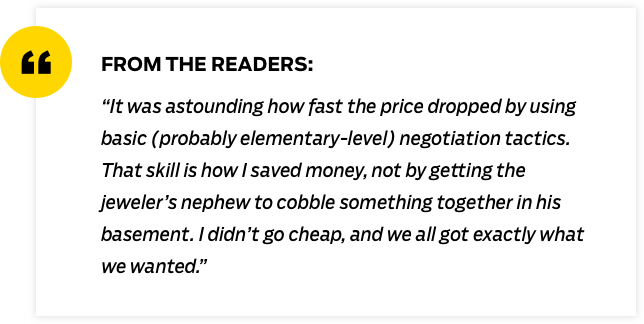
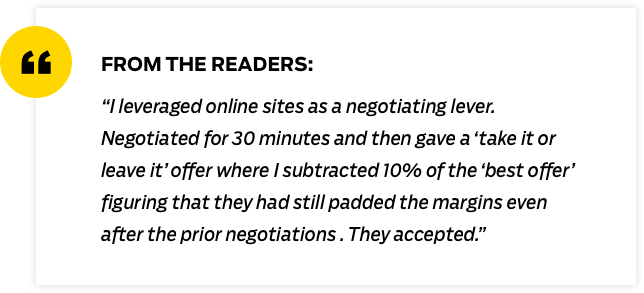
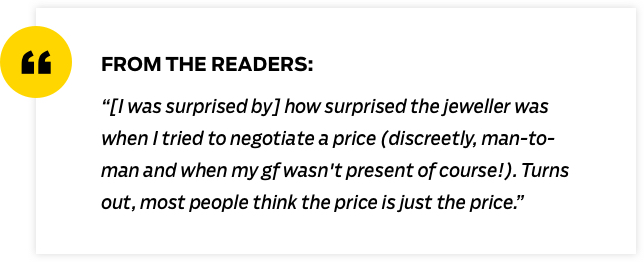
Also, DO NOT BE MISLED BY THINKING ABOUT RESALE VALUE. Your diamond is basically worthless the minute you walk out of the store. Lots of people think they can resell their diamond for a pretty good percentage of the original price — and they are all wrong. You can read a detailed account of trying to resell a diamond here (amazing article), but my personal rule of thumb is that if you ever tried to resell the diamond, you should assume a 15% return. In other words, if you have a $1,000 ring and try to sell it, you might get $150 — if you’re lucky.
In fact, once it’s clear you’re about to buy, you should be open about pricing: Don’t try to beat around the bush or “hint” about negotiation. Be open: Ask for the pricing chart.
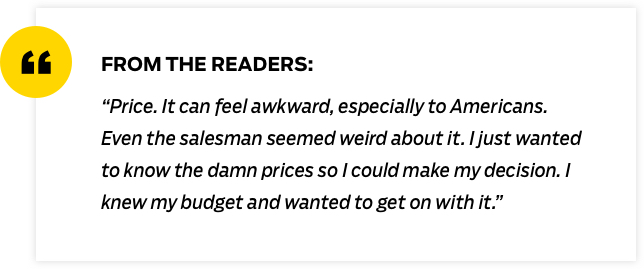
Ask how they charge. They expect it, and many of the hungriest jewelers will just show you their pricing and charge you a small percentage over cost.
ACTION STEP: Prepare for your negotiations. For my very best negotiation tactics, be sure to check out my article on the 4 simple rules of negotiations.
Ramit’s big takeaways on buying an engagement ring
My overall insights on buying an engagement ring:
- 80% of the work is done before you set foot in a jewelry shop. As one of my friends said, “I didn’t know what I was doing, but I knew I was doing it wrong.” The best way to combat this is to intentionally prepare by making a few key decisions before you walk into your first jewelry store. Specifically, get on the same page with your partner, know your general spending range, see multiple jewelers, make them work for your business, and remember that a diamond is just a small part — but an important part — of building a life together. If you follow the steps in this post, you’ll be far ahead of almost everyone else.
- The single-most important part of the process is having an open discussion with your partner. Too many people think the engagement ring should be a surprise. Wrong! Your proposal date should be a surprise. How you propose should be a surprise. But you should know exactly what kind of ring your partner wants. Get on the same page about the style of ring she wants. And clarify any questions about the budget using my scripts above.
- Know that a ring is a symbol for something greater. Talking about a ring also means talking about your future together — and that’s where the real value of this process is apparent. Where do we want to live? Will both of us work? How do we want to raise kids? Do we even want kids? I consider this the “secret sauce” of this post: It was easy to get fixated on the ring shopping, the proposal, and thinking about the budget. But those were ultimately details. What really mattered was us creating a new chapter of our lives together — and being open about it with each other.
How to spend whatever you want on an engagement ring
The #1 question about engagement rings is almost always about cost.
And as I’ve shown you, I have a different view than most people: If you want a $1,000 ring, great. If you want a $50,000 ring, also great. Again, the real meaning isn’t in the dollars you spend, but in the new chapter of your relationship.
The easiest way to pay for a ring is to have followed the “automatic savings plan” in my book. Just like I wrote there, I’d been saving for a ring for about 10 years — even before I was in a relationship!
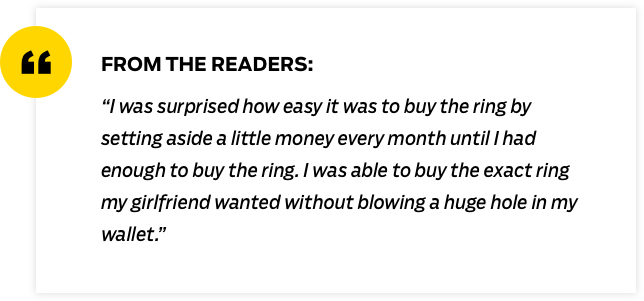
As the quote goes, “The best time to plant a tree was 20 years ago. The second best time is now.”
If you’re reading this, chances are you’re ready to pop the question, which means you don’t have 10 years to save up for the ring. That’s fine. I suggest my article on how to make money fast for some ideas on long-lasting ways to have more money to put toward your ring.
But if I’m catching you early, I have the perfect system for you to start saving for your engagement ring: Conscious Spending Plan.
This is the exact same system that my friend uses to spend $21,000 going out to bars and having a good time with friends. This is the exact same system I used to automatically save for the ring, so cost wasn’t a primary issue.
This system — which I’ll show you — lets you:
- Automate your finances
- Know where your money goes so you’re in complete control of the situation
If you want to learn more on how to automate your finances, check out this 12-minute video of me explaining the exact process I use below.
Being able to buy the engagement ring you want is only a small part of your journey to a Rich Life. That’s why I want to offer you something my team and I have been working on to help you earn more money to live the life you want: The Ultimate Guide to Making Money.
Download a free copy of my Ultimate Guide to learn my best strategies for creating multiple income streams, starting a business, and increasing your income by thousands of dollars a year.
(Thanks to Derek Halpern, Steve Kamb, Nick Gray, Vasu Vats, and my fiancée Cass for reviewing drafts of this post, and to all the readers who sent along their stories and advice.)
How much to spend on an engagement ring is a post from: I Will Teach You To Be Rich.
Via Finance http://www.rssmix.com/
No comments:
Post a Comment